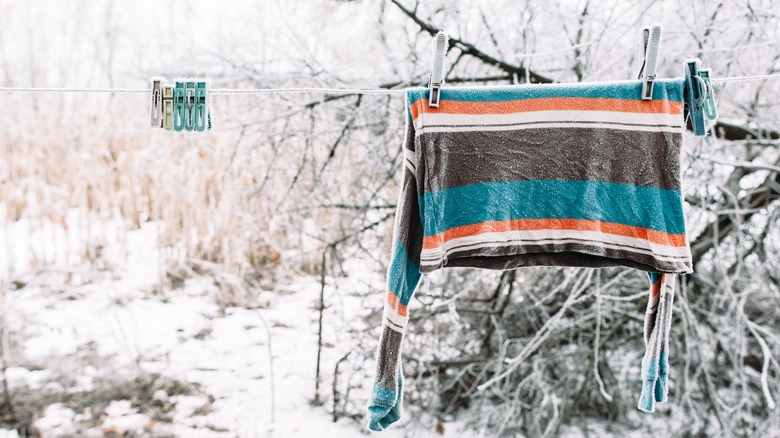Can Salt Water Really Prevent Laundry From Freezing On The Clothesline?
Many Americans air-dry their clothes outdoors throughout the year for one reason or another. This typically isn't problematic during the warmer months, but it can be in the winter, especially if you live in a state where freeze risks are common. If you're new to cold-weather line drying, you may have heard or read that rinsing clothes in salt water prevents them from freezing, but is there any truth to the claim? Yes and no.
Fresh, unsalted water freezes when it reaches 32 degrees Fahrenheit, but when you add salt to water, it lowers the freezing temperature. The exact freezing temperature of salt water varies, depending on the salt-to-water ratio. But even at maximum salt saturation, the water can still freeze if it reaches about -6 degrees Fahrenheit. Although it never gets that cold in many states (which would mean that salted water can prevent clothing from freezing), chances are, you still won't want to dump an excessive amount of salt in your rinse water.
The good news is that a saltwater rinse could still benefit outdoor, cold-weather laundry drying, whether it's intended to prevent freezing or not. Plus, there are other ways to prevent clothes from freezing on the clothesline that don't involve minerals at all.
Benefits of rinsing clothing in salt water before outdoor drying in the winter
Soaking clothes in salt water before washing them can help remove wrinkles and stains while preventing color bleeding. It can also soften fabrics. Using salt water after washing clothes, however, provides an additional benefit when you dry your laundry outdoors in the wintertime by delaying the freezing process.
Even though many cities like Marquette, Fargo, and Anchorage can easily drop to -6 degrees Fahrenheit and lower at night during the winter, temps typically drop after sunset, regardless of where you live. So if you live in a city known for its brutally cold temps, and you set your salt-rinsed clothes out to dry in the late morning (hopefully on a sunny day), they'll have several hours of daylight to dry. If the temperature drops after sunset, the salt water could potentially extend your outdoor drying time as long as temps stay above -6 degrees Fahrenheit.
So, although salt can't prevent water from freezing, it delays the point that the freezing process begins. This could equate to freeze prevention, depending on the air temperature and the amount of salt added to the rinse water.
Ways to prevent laundry from freezing without salt
The most obvious way to keep clothing from freezing is to prevent them from being exposed to freezing temperatures. This could mean you'll end up bringing clothes inside that aren't completely dry. If that's the case, you'll need to find a place indoors to hang them or lie them down flat to finish drying. A good place is a basement or garage if you don't have a laundry room. Of course, you could also use an iron, hair dryer, or fan to speed up the drying process.
You could also just skip the outdoor clothesline entirely if you don't want to deal with having to place the laundry in two different places for drying. After thoroughly wringing your clothing (either by hand or in the spin cycle of a washing machine), hang it up over an area that you don't mind getting wet.
And if your laundry does happen to freeze outdoors, whether they were rinsed in salt water or not, it likely means it is "freeze-dried." This occurs when ice evaporates into a vapor. Simply bring the clothing inside until it thaws, which should take less than 10 minutes. Avoid attempting to manually reform a garment, as it could actually break in half if it's frozen solid enough.


